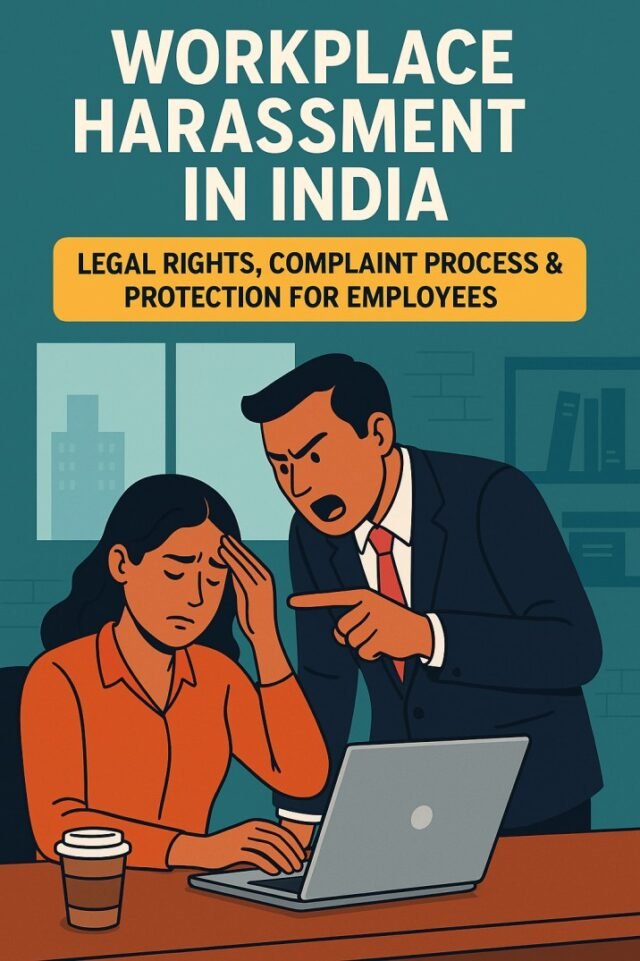Workplaces are meant to be safe, respectful, and empowering. But unfortunately, many employees — especially women — face harassment that often goes unreported due to fear, shame, or lack of legal knowledge.
This blog dives into the types of workplace harassment, your legal rights under Indian law, and how to take legal action to protect yourself or your employees.
🔍 What Is Workplace Harassment?
Workplace harassment includes any unwelcome behavior, conduct, or communication that humiliates, offends, or threatens an employee. It can be verbal, physical, or even digital.
👇 Types of Harassment at Work:
-
Sexual harassment
-
Verbal abuse or insults
-
Bullying, intimidation or threats
-
Discrimination based on gender, caste, religion, etc.
-
Unwanted touching or gestures
-
Passing offensive jokes or comments
-
Spreading false rumors or character attacks
⚖️ What Does Indian Law Say?
🔐 The Sexual Harassment of Women at Workplace (Prevention, Prohibition and Redressal) Act, 2013 (POSH Act)
This landmark law was created to protect women from sexual harassment in any workplace — whether public or private, organized or unorganized.
📌 Key Features:
-
Every workplace with 10 or more employees must set up an Internal Complaints Committee (ICC)
-
Complaints must be addressed within 90 days
-
No woman should face retaliation for filing a complaint
-
Male employees can also seek remedy under other laws such as IPC or HR policies
🧑⚖️ How to File a Complaint Under POSH Act
✅ 1. Written Complaint
-
Should be submitted to the Internal Complaints Committee (ICC) within 3 months of the incident.
-
Can be extended in exceptional circumstances.
✅ 2. Internal Inquiry
-
The ICC investigates with confidentiality and neutrality.
-
Both the complainant and the accused are heard.
✅ 3. Action
-
If found guilty, the employer can impose penalties, suspension, termination, or legal proceedings.
✅ 4. Appeal
-
Either party can appeal the decision within 90 days to a higher authority or court.
📜 Other Legal Provisions for Harassment
-
Section 354A IPC – Sexual harassment
-
Section 509 IPC – Words or gestures insulting a woman’s modesty
-
SC/ST Act, 1989 – For caste-based harassment
-
Article 21 of the Constitution – Right to dignity and safety
🛡️ How to Protect Yourself in the Workplace
| PROTECTION TIP | WHY |
|---|---|
| Know your company’s POSH policy | Every company must share this with employees |
| Keep a record of incidents | Emails, screenshots, messages as evidence |
| Speak up early | Escalating early can prevent larger harm |
| Don’t ignore emotional abuse | It’s as serious as physical or sexual harassment |
| Use support systems | HR, ICC, or even NGO/legal support |
💼 Employers’ Legal Responsibility
-
Provide a safe working environment
-
Conduct regular POSH awareness sessions
-
Form and train ICC members
-
Strict action on confirmed complaints
-
Failure to comply can result in fines up to ₹50,000 or more
🧠 Advice from Literallaw:
-
Harassment is not a “personal issue” — it’s a legal violation.
-
Document everything and don’t be afraid to ask for help.
-
Even men and transgender persons can seek justice under IPC.
-
If your company has no ICC, report to your state’s Local Complaints Committee (LCC).
🚨 Conclusion: Know the Law, Demand Respect
Every employee has the right to dignity, safety, and respect at work. The law protects you — but only if you use it. Speak up, file your complaint, and claim your legal space. Harassment must stop where the law begins.
Facing harassment or need help with a POSH case? Reach out to [Literallaw] for confidential and expert guidance.
#POSHAct #WorkplaceRights #HarassmentLaw #LegalAwareness #Literallaw









